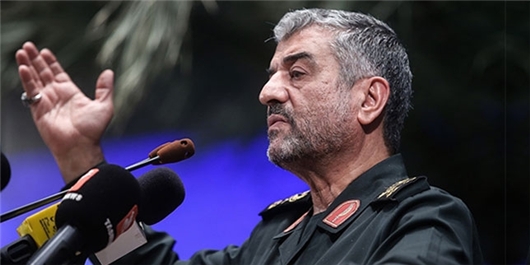PHOTO: General Mohammad Ali Jafari, head of the Revolutionary Guards
In another illustration of growing tension and concern inside Iran’s elites, the head of the Revolutionary Guards has warned of a “fourth sedition” backed by foreign countries, attacking the Rouhani Government for its engagement of the US and the West.
General Mohammad Ali Jafari said at a conference on Tuesday that the US will use the July 14 nuclear deal and its implementation to force further negotiations which will seek to “penetrate” Iran: “If this belief is created among the people that since on the nuclear deal there is an agreement and so on other issues we can reach an agreement, [then] this is a danger and a sedition.”
Jafari’s declaration reinforces the Supreme Leader’s rejection of any talks with the US on regional issues, linking them to the attempted “sedition” — the regime’s code for dissent, including the mass protests over the disputed 2009 Presidential election. On Sunday, Ayatollah Khamenei repeated his denunciation of Washington, with references to crises over Syria, Yemen, Iraq, and Palestine, and on Tuesday he told university students that “America” is dedicated to “conspiring” against the Islamic Republic.
See Iran Analysis: Supreme Leader Slaps Down Rouhani’s “Naive” Foreign Policy & Talks with US
The rhetoric also is a sign of the hostilities within the regime with the approach of Parliamentary and Assembly of Experts elections in February. Hardliners are trying to align against a bloc which could include supporters of President Rouhani and former President Hashemi Rafsanjani and reformists.
On Monday, two more journalists were arrested, including Isa Saharkhiz, a leading Iranian correspondent who was also Deputy Culture Minister in the reformist Khatami Government in the late 1990s.
Jafari said yesterday that the “first sedition” was the Iran-Iraq War of the 1980s, followed by the second in the 1999 Tehran protests, and then the mass demonstrations in 2009. While the Revolutionary Guards had been instrumental in putting these down, he warned:
In this [fourth] sedition, [the US] excuse was nuclear discussions. It seems that the sedition that will begin after the JCPOA [Joint Comprehensive Plan of Action] will be long and may take several years….
Hezbollahis [loyalists] and those who are concerned about the revolution must be careful for post-JCPOA infiltration.
Jafari then implicitly attacked the Rouhani Government:
We consider negotiations equal to infiltration. It is unfortunate that some domestic officials do not understand this.
Unfortunately, some officials say that we can reach a resolution with the enemy and keeping saying: “Now that we have reached an agreement with America in the nuclear matter, there is the possibility of other discussions.” The danger is here and we must be careful.
In this atmosphere, some officials who trust liberalism and the West may neglect the warnings about the threat. Just as the Supreme Leader has said, political and cultural infiltrations are far more dangerous than other infiltrations. But some on the inside unfortunately assist the enemy’s goal…of infiltration.
The commander said there are “special expectations” that Iranian college students will expose or “take any other actions” against the US, although they should refrain from “violent action [which] might backfire”.

